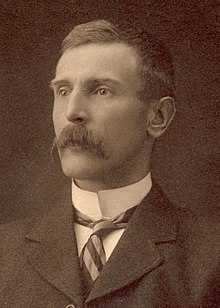
Back جيمس وايتسايد ماكاي Arabic چيمس وايتيسيد مكاى ARZ James Whiteside McCay German جیمز وایتساید مککی Persian James Whiteside McCay French James McCay Polish
Sir James Whiteside McCay | |
|---|---|
 | |
| Minister for Defence | |
| In office 18 August 1904 – 2 July 1905 | |
| Prime Minister | George Reid |
| Preceded by | Anderson Dawson |
| Succeeded by | Thomas Playford |
| Member of the Australian Parliament for Corinella | |
| In office 29 March 1901 – 12 December 1906 | |
| Preceded by | New seat |
| Succeeded by | Division abolished |
| Personal details | |
| Born | 21 December 1864 Ballynure, County Antrim, Ireland |
| Died | 1 October 1930 (aged 65) Melbourne, Victoria, Australia |
| Nationality | Australian |
| Political party | Protectionist |
| Spouse |
Julia Mary O'Meara
(m. 1896; died 1915) |
| Children | Margaret Mary ("Mardi") McCay Beatrix Waring ("Bixie") McCay |
| Alma mater | University of Melbourne |
| Occupation | Solicitor, politician, army officer |
| Military service | |
| Allegiance | Australia |
| Branch/service | Australian Army |
| Years of service | 1884–1926 |
| Rank | Lieutenant General |
| Commands | AIF Depots in the United Kingdom (1917–19) 5th Division (1916) 2nd Infantry Brigade (1914–15) 8th Regiment (1900–07) |
| Battles/wars | First World War: |
| Awards | Knight Commander of the Order of St Michael and St George Knight Commander of the Order of the British Empire Companion of the Order of the Bath Colonial Auxiliary Forces Officers' Decoration Mentioned in Despatches (4) Commander of the Legion of Honour (France) |
Lieutenant General Sir James Whiteside McCay, KCMG, KBE, CB, VD (21 December 1864 – 1 October 1930), who often spelt his surname M'Cay,[1] was an Australian general and politician.
A graduate of the University of Melbourne, where he earned Master of Arts and Master of Laws degrees, McCay established a successful legal practice, McCay & Thwaites. He was a member of the Victorian Parliament for Castlemaine from 1895 to 1899, where he was a champion of women's suffrage and federation. He lost his seat in 1899 but became a member of the first Australian Federal Parliament in 1901. He was Minister for Defence from 1904 to 1905, during which he implemented long-lasting reforms, including the creation of the Military Board.
As a soldier, McCay commanded the 2nd Infantry Brigade in the landing at Anzac Cove on 25 April 1915, during the Gallipoli Campaign of the Great War. He was later wounded in the Second Battle of Krithia and invalided to Australia, but returned to command the 5th Division, which he led in the Battle of Fromelles in 1916, dubbed "the worst 24 hours in Australia's entire history."[2] His failures in difficult military operations made him a controversial figure who earned the disfavour of his superiors, while his efforts to succeed in the face of insurmountable obstacles earned him the odium of troops under his command, who blamed him for high casualties. In the latter part of the war he commanded the AIF Depots in the United Kingdom.
After the war, McCay resumed his old job as Deputy Chairman of the State Bank of Victoria and also served on a panel that deliberated on the future structure of the Army. He was chairman of the Fair Profits Commission, the War Service Homes Scheme of the Repatriation Commission, and the Repatriation Commission's Disposals Board. He commanded the Special Constabulary Force during the 1923 Victorian Police strike.
- ^ Cite error: The named reference
adbwas invoked but never defined (see the help page). - ^ McMullin 2006